广州版.小学英语.一般将来时—— 教师版
时态混合:一般现在、一般过去和一般将来时、现在进行时(教师版)

知识图谱一般现在时知识精讲一、一般现在时表示通常性、规律性、习惯性、真理性的状态或者动作有时间规律发生的事件的一种时间状态。
二、句子结构主语(第一/二人称/第三人称复数)+do (动词原形)主语(第三人称单数)+does (动词三单形式)主语+am/ is /are用法示例表示经常性或习惯性的动作We get up at six every morning.我们每天早上六点钟起床。
表示现在的状态、能力、性格Mr. Wang writes good English but he doesn’t speak well.王先生的英文写得很好但他说不好。
表示格言或警句Pride goes before a fall.骄者必败。
表示永恒的客观真理The earth moves around the sun.地球绕着太阳转。
四、时间状语1. 表示频率的副词: always, usually, often, sometimes, never, hardly, seldom…2. every/once+名词: every day/ week/ year, once a week/ month …3. 表示时间的短语: twice a day, on weekends, on Mondays…情况变形示例一般情况加-s help-helps play-plays以辅音字母+o结尾加-es go-goes do-does以x, sh, ch, s结尾加-es teach-teaches brush-brushes以辅音字母+y结尾变y为i加es study-studies try-tries特殊情况没有统一的规则have-has; be-isbe动词行为动词用法我是am你是are;is跟着他/她/它;复数都用are。
主语是第三人称单数外,都用动词原形;主语是第三人称单数时,动词词尾加-s或-es。
肯定式I am a student.我是一名学生。
广州小学英语毕业总复习时态

小学英语毕业总复习(四)时态小学阶段一共学了四种时态,分别是:一般现在时,一般将来时,现在进行时,一般过去时。
下面我们一一进行总结。
1、一般现在时A、表示不受时限的客观存在如:He is a boy. She is a student. My mother is a nurse.This is a dog. I have a story-book.B、表示现在的习惯动作,即指现在经常发生的动作,一般现在时常用来表示现在时间里某种动作的经常性和习惯性。
它常与表示程度或频度的词连用,如:often(经常), usually (通常,一般), sometimes(有时), always(总是,一直), never(从不)如:I often go to school on foot. My father works in a school.Mike watches TV every day.I usually play computer games on the weekend.C、表示现时的状态和现在瞬间动作如:How are you? You look happy.What’s the matter with you? I have a headache.What do you have for lunch? I have some chicken.☆注意☆英语动词的现在时与原形同形。
但当主语是第三人称单数时,须在词尾加-s 或-es。
例如:I have a fish for dinner. Her mother works in a hospital.Amy often goes to school by bike. Mr. Liu teaches us English.加-es 的动词必须是以“sh , ch , o ”等字母结尾的。
如:watches , teaches , goes , washes2、一般将来时表示在将来会发生的事或动作。
广州版小学英语时态归纳笔记

4种时态知识归纳
一般现在时找人称,第三人称单数,动词要加s或es.动词变成第三人称单数时要注意:
1.一般情况加s, 如read---reads
2、以ch , sh , s , o 或x结尾的词加es , 如wash---washes
3、以辅音字母加y结尾的词,变y为i再加es , 如try---tries
(buy 三单形式是buys!!!因为u不是辅音字母)
现在进行时一定有be(is , am , are)动词和动词的ing。
一般过去时表示过去某个时间发生的动作或情况。
动词过去式的几种情况:
1、直接加ed :play—played help--helped
2、以e结尾的加d :close—closed live--lived
3、以辅音加y结尾的把y 改成i加ed :carry—carried study—studied
4、特殊形式(1) :come—came run—ran am—was buy-bought have-had
fall-fell fell -felt (这两个要区分)。
广州版小学六年级英语一般将来时

3.How will you go on your holiday?
___________________________________________________________
A. do B. am doing C. am going to do
()2. He often ___________ to school with his friend.
A. go B. goes C. going
()3. Will you ___________ noodles for breakfast tomorrow morning?
构成:
(物(第(1)第一人称:I / we) + shall+动词原形,例如:
We / I shall go to park next day.
否定形式:+shall not +动词原形,例如:
We / Ishall not go to parknext day.
提问:Shall…+动词原形…?,例如:
11. _______ you _______ (visit) the museum next Thursday?
No, I______________.
12. I___________ ________(understand) the book next week. Because I __________
9.I ____________________________________(学习)in the library one hour later.
广州版小学英语四种时态比较讲解及练习

广州版小学英语四种时态比较讲解及练习小学六年级(上册)英语专题学案(1期)8rc9小学英语四种时态的比较一、重点内容时态定义标志词谓语形式疑问形式否定式提问谓语一般现在时1、目前存在的状态2、经常性、习惯性的动作频度副词:例:always, usually, often,sometimes, everyday(week、Sunday …)、never1、主语+系动词be( am,is, are)2、主语+行为动词原形;3、主语为第三人称单数时V + s, 或es1、be 放主语前2、主语前加do 或does(动词还原)1、be + not2、动词前加don’t 或doesn’t (动词还原)What do /does + 主语+ do…?如:What does she do every day? She reads English every day.现在进行时表示目前正在发生的动作或存在的状态1、提示语:look! Listen! now、See?2、At +时间点3、前面有祈使句4、I t’s+具体时间特定情景主语+be (am, is, are ) + V-ingbe放在主语前be + not What is / are +主语+ doing?如:What are you doing now? We’re listening now.一般将来时1、表示计划或打算做某事2、将要发生的动作或存在的状态1、tomorrow, the next day,this evening this afternoon, soon2、the day after tomorrow, next ~(week,term,month,year …)3、in +未到年份如in 2015 1、主语+be going to + V 原形2、主语+will + V 原形3、go, come, leave 等用现在进行时表示将来4、want 用一般现在时表将来be 或will 放主语前be 或will 后加notwill not = won’t1、What is/ are +…going to do…?2、What will + 主语+do…?如:What will he do next week? He will play basketball next week.一般过去时表示过去时间内发生的动作或存在的状态1、y esterday, last~(week,year,month…)the day beforeyesterday,just now等2、two years ago/ at that time/ before等3、in +过去年份主语+动词be 的过去时(was, were)2、主语+行为动词的过去式1、was / were放主语前2、主语前加did (动词还原)1、was/ were + not2、动词前加didn’t(动词还原)What did + 主语+ do…?如:What did Tom do last night? T om did his homework last night.二、巩固练习一般现在时练习题(一)、用单词的正确形式填空:1.Mike _________ (do) his homework every day.2.There __________(be) some water in the glass.3.We like ________ (play) basketball after class.4.I like singing. I often _________(listen) to the music in the evening.5.My grandma_________(watch) TV every day.(二)、判断句子的正误, 并改正。
广州版五年级英语上册一般将来时复习课课件
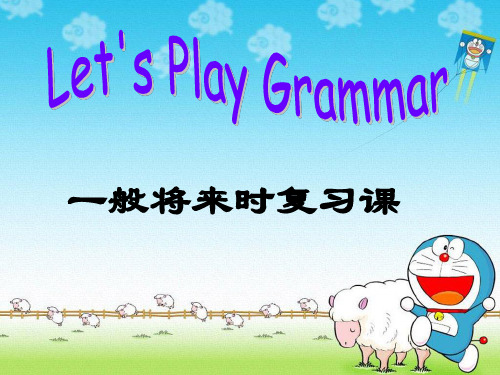
Where are they going? They are going to school.
What are they going to do? They are going to read a book.
刚才我们找出了歌词的规律了,同学们现在让我们编一编这首 诗歌帮助Mike记住规律吧
一般将来时 __________事, 记住要用将来时。 be going to 加_____, be ______及时变 单数is,复数____, _____要跟在I 后面。 还有一种表达法, _____后要加动原形。
_H_e__is__fr_o_m__A_m__e_ri_c_a_. _
2.Where is Mike’s father going?
_H_e__is__g_o_in_g__to__C_h_i_n_a._
3.How is Mike’s father going to get there “by ship” or “by sheep”?
Mike
Mike 正在练习生日晚会上表演的歌曲,可是调皮的小猫把 歌词给踩脏了,请你帮他把歌词重新填好
Where are you going?
going to the show.
What are you going to do? I am going to photos.
Where is he going ? What is he going to do?
3.How is Mike’s father going to get there “by ship” or “by sheep”? _____________________
Mike 听完了爸爸的话还是没有明白过来,他看看同学们的 理解是怎么样的,请你回答下面的问题。
广州版英语五年级上册语法知识点总结
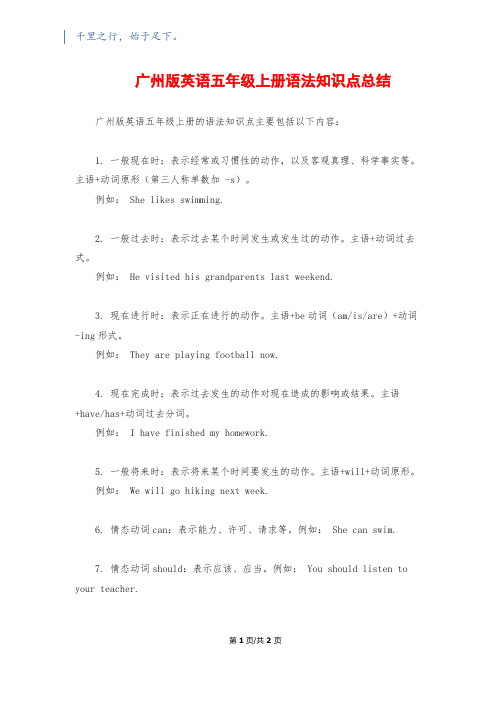
千里之行,始于足下。
广州版英语五年级上册语法知识点总结广州版英语五年级上册的语法知识点主要包括以下内容:1. 一般现在时:表示经常或习惯性的动作,以及客观真理、科学事实等。
主语+动词原形(第三人称单数加 -s)。
例如: She likes swimming.2. 一般过去时:表示过去某个时间发生或发生过的动作。
主语+动词过去式。
例如: He visited his grandparents last weekend.3. 现在进行时:表示正在进行的动作。
主语+be动词(am/is/are)+动词-ing形式。
例如: They are playing football now.4. 现在完成时:表示过去发生的动作对现在造成的影响或结果。
主语+have/has+动词过去分词。
例如: I have finished my homework.5. 一般将来时:表示将来某个时间要发生的动作。
主语+will+动词原形。
例如: We will go hiking next week.6. 情态动词can:表示能力、许可、请求等。
例如: She can swim.7. 情态动词should:表示应该、应当。
例如: You should listen to your teacher.第1页/共2页锲而不舍,金石可镂。
8. 基数词和序数词的用法。
例如: six cups,the first book。
9. 形容词的比较级和最高级形式。
例如: tall-taller-tallest,good-better-best。
10. 疑问词的用法。
例如: What's your favourite colour?11. 人称代词的主格和宾格。
例如: I like apples. Give it to me, please.12. 反意疑问句。
例如: You like Chinese food, don't you?13. 特殊疑问句。
语法专题复习四大时态(讲义)粤人版英语六年级下册
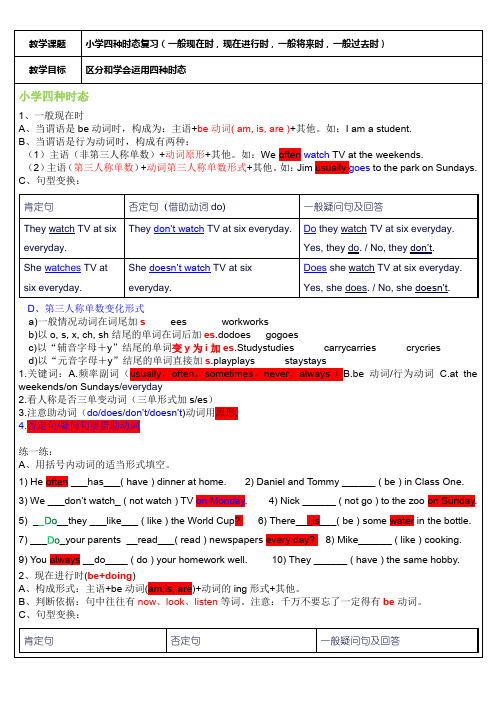
2.以不发音的e结尾,去e加ing,如:makemaking, tastetasting
3.如果末尾是一个元音字母和一个辅音字母,双写末尾的辅音字母,再加ing,如:runrunning, stopstopping
1.关键词now现在、look看、listen听/be doing
d)以“元音字母+y”结尾的单词直接加s.playplays staystays
1.关键词:A.频率副词(usually,often,sometimes,never,always)B.be动词/行为动词C.at the weekends/on Sundays/everyday
2.看人称是否三单变动词(三单形式加s/es)
肯定句
否定句
一般疑问句及回答
She is going to have a picnic tomorrow.
She isn’t going to have a picnic tomorrow.
Is she going to have a picnic tomorrow?
Yes, she is. / No, she isn’t.
A.learn B. learns C. learning
( ) 4.she ________ dancing now.
A isB areC am
( )5. Look! the rabbit is ________.
A .jumping B. jump C. jumps
3、一般过去时(ed)
A、构成形式:主语+动词的过去式+其他。
练一练:
A、用动词的适当形式填空。
1) It_____( be ) Ben’s birthday last Friday. 2) We all_____ ( have ) a good time last night.
广州版小学英语知识点总结
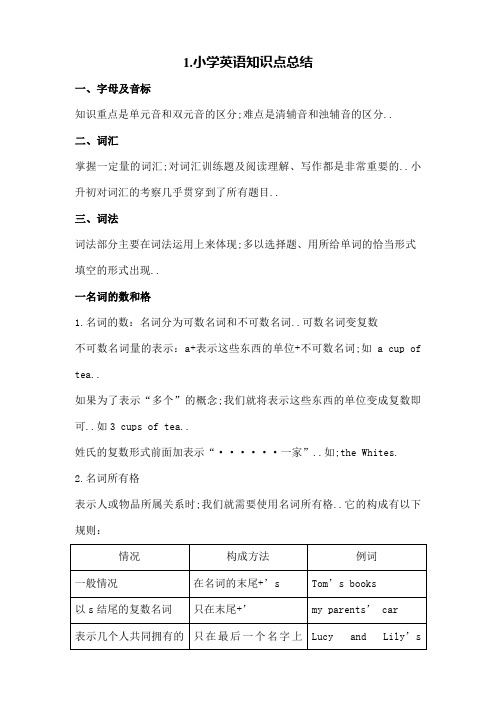
1.小学英语知识点总结一、字母及音标知识重点是单元音和双元音的区分;难点是清辅音和浊辅音的区分..二、词汇掌握一定量的词汇;对词汇训练题及阅读理解、写作都是非常重要的..小升初对词汇的考察几乎贯穿到了所有题目..三、词法词法部分主要在词法运用上来体现;多以选择题、用所给单词的恰当形式填空的形式出现..一名词的数和格1.名词的数:名词分为可数名词和不可数名词..可数名词变复数不可数名词量的表示:a+表示这些东西的单位+不可数名词;如 a cup of tea..如果为了表示“多个”的概念;我们就将表示这些东西的单位变成复数即可..如3 cups of tea..姓氏的复数形式前面加表示“······一家”..如;the Whites.2.名词所有格表示人或物品所属关系时;我们就需要使用名词所有格..它的构成有以下规则:二动词表示动作和状态的词叫做动词..通常词的学习与时态结合起来学习;它分为:一般现在时“三单”人称V. + s/es; 一般过去时V. + ed; 现在进行时V. + ing ..三形容词、副词形容词和副词的比较级和最高级的构成规则:通常词尾+er / est..比较级和最高级不规则变化的形容词和副词:many/much-more-most; good/well-better-best; bad/badly-worse-worst; little-less-least 形容词和副词的比较级和最高级的用法:比较级用于二者的比较;表示“更······”之意..而最高级用于三者或三者以上的比较..表示“最······”..两者比较时句中有than..形容词最高级前一定要有the;而副词最高级前则不需要..四代词:人称代词和物主代词1.人称代词的宾格2.名词性物主代词3.不定代词some、any、one、ones:some表示“一些”;可以接可数复数名词..any 用在疑问句或否定句中..One代表单数可数名词;ones代表复数可数名词..五数词数词包括基数词和序数词..它们的用法:时间的表达、年、月、日的表达、数学符号的表达..六冠词冠词分为定冠词、零冠词和不定冠词..1.不定冠词:a用在以辅音音素开头的单数可数名词..an用在以元音音素开头的单数可数名词前..2.定冠词the的用法:特指某一个具体的人或事物;指说话的两个人都心照不宣的同一个人或事物;指上下文中提到的人或物;用在序数词、形容词最高级以及方位词的前面..用在世界上独一无二的事物前;用在乐器名词前;用在固定搭配中..3.零冠词:国名、地名、人名等专有名词前;名词前已经有this、that、his、my、any等限定词时;其它情况..七介词1.介词in的用法:1 in 后面加上“衣帽”类单词;表示“穿戴着……”..如:In a coat 穿着外套 in dress穿着裙子In T-shirts穿着短袖 In shorts穿着短裤in shoes穿着鞋子 In socks穿着袜子2in 后面加“位置”类单词;表示“在……里面”..如:The books are in my desk. 这些书在我的书桌里..2. at: 在1 表示时间;后接具体时间点;2 表示地点;后接小地点Let’s meet at 7:00 in the evening.I am at home now.3. With: 有;和……在一起with a cap 、 with a hatWith a bag in her hands. 她手里拿着一个包..4. Beside: 在……旁边There is a river beside my house.四、句法与句型小学部分涉及到四种时态:一般现在时、一般将来时、一般过去时、现在进行时..在考试的作文部分;经常会考到:描写人、动物、城市、植物、节日、季节、过去事情、一天的日程安排、计划及看病、问路、打电话等话题的作文..在写的时候首先一定要选准时态;每时每刻都要注意有没有用错;写完一定要复查..一一般现在时1.一般现在进行时的定义及标识词:表示经常、习惯性动作..关键是掌握①标志词:always; usually; often; never; sometimes; seldom; every+时间等..②当主语是第三人称单数时;动词就要加s/es.其它人称统一用动词原形..二一般将来时1.一般将来时表示将要发生的事情..通常用两种形式来表示:1be going to+动词原形;2will/shall+动词原形..前者强调“打算”要做一件事情;而后者只是客观地说明一件事情将要发生..三一般过去时1.一般过去时表示在过去某一时间里发生的事情..我们用动词的过去式来表示;也就是说在动词末尾+ed来完成..四现在进行时1.现在进行时表示正在进行的动作..其谓语的特点是:be + V-ing..学好现在进行时的关键是①be动词的选择②动词—ing的变化规则..刚开始学习英语的同学;往往对我联系动词be与主语人称保持一致的问题把握不好..为此;建议在歌谣中熟悉我联系动词的“身影”:我用am;你用are;is用在他、她、它;遇到复数全用are..五There be句型There be句型用来表示某地 /某时有某物/某人..五、英语常识英语常识渗透在一些主观题上;平时一定要多留心..1.常见的节日2.国家、首都、语言、国籍、最大的城市3.中国和西方不同之处六、课后练习一、语音:找出划线部分读音不同的单词B. bookC. lookD. cook1. A. toothB. spreadC. meanD. peace2. A.cheapB. roundC. houseD. young3. A.loudB. noiseC. hasD. maps4. A.flags5. A.B. bankC. certainD. drinkuncle二、单项选择6. I have ________ to tell you. But first; please help _________ to _________fish; children.A. anything important; our; anyB. something important; yourselves; someC. important everything; yours; eachD. important thing; us; other7. Tom and Jerry are twins and they are_________. Their family ________ good. Now the family_________ watching TV.A. we heros; are; areB. ours heros; are; isC. our heroes; is; areD. us heroes; is; is8. ---Have you seen _____bag I left it here just now. It’s _____ Browns.--- Is it ________ one on the chair near the doorA. a; the; theB. the; the; theC. a; a; aD. the; the; a9. Do it__________. The film will be on_________ 30 minutes. I think the Captain America. The first Avenger is __________ X Men.A. quickest; by; more 2 hundreds times interesting thanB. quicker; for; 2 hundred time less interesting thanC. more quickly; in; 2 hundred times less interesting thanD. quicklier; to; 2 hundreds time more interesting than10. When we are________; he is alone _________ with nothing.A. at table; at the tableB. at a table; on tableC. on the table; on tableD. on table; at a table11. The weather is not too cold______ too hot in this season. Let’s go ______ a science trip.A. and; forB. nor; toC. but; withD. or; on12. She is ________ surprised________ she can’t believe her eyes. I’ll tell her the truth________ I see her.A. too; to; andB. so; that; as soon asC. such; so; whenD. not; but; that13.There_________ any bread in the fridge. Let’s _________ to buy some;________A. are; goes; will youB. is; going; will youC. aren’t; went; shall weD. isn’t; go; shall we14. I_______ nothing in my pocket. But ________ iPhone and 2 computers on the table.A. have; there is anB. has; I haveC. there be; there areD. there be; there is a15. Her handwriting is as________ as________.A. well; IB. better; meC. good; mineD. best; mind16. _________ clever you areA. What aB. HowC. WhatD. How a17. I want to find a good book. I’m going to the_________.A. cinemaB. libraryC. museumD. supermarket18. Who’s the lady _______ blueA. inB. onC. atD. with19. Those must________ tulips.A. beingB. isC. areD. be20. ---_________do you go to the cinema ---Seldom.A. WhenB. What timeC. How oftenD. Which三、根据中文; 完成下列的句子; 每空格填一词..21. 孙中山反对帝制;他尽力改变中国和解放人类..Dr .Sun Yatsen was__________ the emperor. He_________ to change China and _______ the people.22. 莫扎特是最伟大的音乐家之一..Mozart was ______________ of the __________ _______________.23. 每天狮子在深林里四处闲逛找食物; 一旦抓到公牛;它就马上把牛吃光..Every day; the lion went around in the forest___________ for food. Once it catches one bull; it will eat it ____________ at ___________.。
一般将来时(讲义)教科版(广州)英语六年级下册

2023-2024学年五升六英语第十一讲:一般将来时专题专项提升(教科版)一、一般将来时1.一般将来时的定义,时间标志词和结构我会观察:找出句子中的时间标志词。
(1) Ao Bing will have a birthday party next week. ____________________(2) Ne Zha is going to buy a gift for Ao Bing tomorrow. ____________________(3) They will meet in four days. ____________________(4) Ne Zha will play football this afternoon. ____________________(5) Ne Zha and Ao Bing will visit China in 2030. ____________________(6) There will be a birthday party next Sunday. ____________________(7) There is going to be a birthday party next Sunday. ____________________我会发现:1. 一般将来时的定义:表示__________发生的动作或情况。
2. 一般将来时的时间标志词:(1) __________ 型。
如:tomorrow morning, the day after tomorrow(2) __________ 型。
如:next month, next week, next year(3) in + __________。
如:in 2090, in 2030(4) “ __________ +时间”型。
如:this year, this month(注意“this+时间”也可能是表示过去的时间,要看具体情况)5) 其他:tonight, soon, from now on, in the future, later3. 一般将来时的结构:(1) 主语+ _______________ + 动词___________ (形式)(2) 主语+ _______________ + 动词___________ (形式)4. there be的一般将来时结构:(1) There + _______________ + 动词___________ (形式)(2) There + _______________ + 动词___________ (形式)小练笔:1. His daughter __________ __________ (travel) in 2032.= His daughter __________ __________ __________ __________ (travel) in 2032.2. He is going to Beijing _________.A. nowB. yesterdayC. next weekD. 20083. --- How soon will you come back?--- __________.A. This morningB. The day before yesterdayC. NowD. The day after tomorrow4. My mother __________ me a nice present on my next birthday.A. will givesB. will giveC. givesD. give5. There __________ a football match this weekend. I can't wait!A. isB. haveC. will beD. is going to have6. 用词的适当形式填空。
广州版小学六年级英语一般将来时教案

_________ __________(buy) something to___________(eat) there.
Yes, they are.No, they aren’t.
(3)人/物(所有人称:)+will+动词原形,例如:
I / We / You / He / She / They / It / willwash my bag tomorrow.
否定形式:…will not +动词原形
I / We / You / He / She / They / It / will notwash my bag tomorrow.
6. ___________ the pupils __________(go) sightseeing next Sunday?
Yes, they __________. They always ___________(go) sightseeing on Sunday.
7. There___________ __________(be ) a party at our school tomorrow. And they
Yes, I___________.
3. Our father___________(go) to work on foot every day. But he _________ _________(go) to work by bike tomorrow.
4. Listen, the children_______ _______ (sing) in the music room. And they ________
四大时态复习(讲义)教科版(广州)英语六年级下册

小学英语四大时态复习教学目标:1. 掌握四大时态的结构和用法3. 以辅音字母+y结尾的单词,变y为i,再加es。
butterflybutterfliesfamilyfamilies4. 以o结尾的单词:有生命加stomatotomatoespotatopotatoes无生命加espianopianosphotophotoszoozoosradioradios时态专题综合训练一、单项选择1. John _____ football.A. likes playingB. likes playC. like play2. Does your mother _____ football?A. likeB. likesC. like play3. They usually _____ TV in the evening.A. watchB. will watchC. are watching4. —What do you usually do on the weekend?—I often ____.A. do my homeworkB. did my homeworkC. doing my homework5. I don’t like _____ thrillers(恐怖片)______ playing baseball.A. watching; orB. watching; andC. to watch; or6. Bob often _____ to school.A. walkB. walksC. walked7. My pen ______ on my desk ten minutes ago. But it _____ there now.A. is; isn’tB. was; isn’tC. is; is8. Mike is _____ after his classmates.A. runsB. runingC. running9. Be quiet! The babies ________.A. sleepB. are sleepingC. slept10.______ he _____ his homework yesterday?A. Does; doB. Did; didC. Did; do11. —What did you do last weekend.—I ______.A. go swimmingB. did my homeworkC. went swim12. —What’s your hobby?—_____ is my hobby.A. Collecting stampsB. Collect stampsC. Stamps13. —Where were you just now?—I _____ at school.A. isB. wasC. were14. ______ he ______ his grandparents last month?A. Did; visitedB. Did; visitC. Do; visited15. Last week, we _____ a _____ race.A. hard; runningB. have; runningC. had; running16. I______ to the park last week.A. goB. wentC. going17. If I _____ you tomorrow, I will give you the receipt(收据)。
一般将来时小学ppt课件
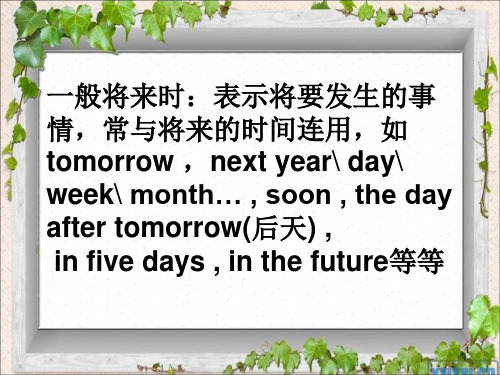
肯定句 :主语 + be ( am, is, are ) + going to + 动词原形 +其他.
I’m going to go there next month. 下个月我将去那里。 He is going to visit his grandparents next year. 明年他将要去看望他的爷爷奶奶。 They are going to find a new house to live in. 他们将要找一所新房子住。
7
三、用现在进行时表示。 经营者提供商品或者服务有欺诈行为的,应当按照消费者的要求增加赔偿其受到的损失,增加赔偿的金额为消费者购买商品的价款或接受服务的费用 表示位置转移的动词(如:go, come, leave, start, arrive等), 可用现在进行时表示将来时。如:
1. Uncle Wang is coming. 王叔叔就要来了。 2. They're leaving for Beijing. 他们即将前往北京。
否定句 : 主语 + be ( am, is, are ) + not + going to + 动词原形 +其他.
He isn’t going to see the movie. 他不会去看电影。 You aren’t going to work on the farm this weekend. 这个周末你们不去家场劳动。 We aren’t going to have a meeting this afternoon. 今天下午我们不开会。
一般疑问句:Will + 主语+动词原形+其他?
一般将来时(讲义)教科版(广州)英语六年级下册

一般将来时一、意义:表示将来某个时间要发生的动作或存在的状态,也表示将来经常或重复发生的动作,常与表示将来的时间状语连用。
如:tomorrow , soon ,next Monday , next year , next weekend , this afternoon , this evening ……二、构成:be going to+动词原形: 表示打算、准备做的事或即将发生或肯定要发生的事。
will+动词原形: 表示将要发生的动作或情况,没有太多的计划性, 还用来表示意愿。
三、变化1)be going to +动词原形将要做某事1.肯定句:主语+be(am /,is,/ are) going to +动词原形+其它成份My sister is going to learn English next year. 我姐姐准备明年学英语。
我爸爸打算明天回来。
翻译:______________________________2.否定句:主语+be(am / is / are)not going to +动词原形+其它成份I am not going to(go to)the cinema tonight. 我今天晚上不打算去看电影。
Linda is going to climb mountains tomorrow.改为否定句:3.一般疑问句:Be (am / is / are)+主语+going to+动词原型+其它成份Is your father going to play basketball with you ?你父亲打算和你去打篮球吗?肯定回答:Yes,he is. 否定回答:No , he isn’t.I am going to climb mountains tomorrow.改为否定句:肯定回答:否定回答:4.特殊疑问句特殊疑问词(Wh)+一般疑问句?Where are you going to spend Spring Festival.? 春节你打算在哪过?I am going to climb mountains tomorrow.改为特殊疑问句:____________________________________I am going to climb mountains tomorrow.改为特殊疑问句:____________________________________Be going to 句型专项练习一、单项选择题( )1、I am going to_________ a football player.A. /B.isC.be( )2、We are going to ________ games.A.playB. playingC.plays( )3、________ is going to finish the work?A. WhatB.WhoC.What( )4、We are going to ________ a picnic next Saturday.A. hasB.haveC.had( )5、They are going to________ .A. going shoppingB. go shoppingC.goes shopping( )6、They aren't going________ shopping.A. to goB. goC./( )7、Are they going to ________ shopping?A. to goB. goC./( )8、She is going to________ basketball.A. playB. playingC.plays二、用正确的形式填空(用be going to 正确形式填空)。
小学英语.一般将来时—— 教师版

Simple Future TensePre-test用括号内所给动词的适当形式填空。
1. I (finish) all the housework in half an hour.2. They_ (not move) away until tomorrow.3.--_ Mr. Frown_ (give) us a talk tomorrow?--Yes, he4.--When_ Lucy (graduate) next year?--She_ (graduate) next July.5. --_ they_ (visit) Australia next week?--No, they .6.--When_ we (start) off?--At six o'clock.7. Look at the clouds. There (be) a storm.8. He_ (leave) when someone calls him.9. -- How do you like our city?--Wonderful. I (stay)here for another two days.10. Tom (be) back in a few days.Keys: 1. will fisnish 2. won’t move 3.Will, give, will 4. will, graduate,will graduate 5.Will, visit, won’t 6.will, start 7.is going to be 8. is leaving 9.will stay 10. will beWarming upOne day, a little lamb is drinking water near a river. A wolf sees him and wants to eat him. So the wolf comes to the lamb and shouts: “You are drinking in my river. I’m going to eat you tonight!”The lamb is very afraid and begins to cry.“Why are you crying?” ask the lamb’s friends.“The wolf is going to eat me tonight,” says the lamb.“Don’t worry, we will help you,” the friends say.At night, the little cat hides behind the tree near the lamb’s house. The little horse and the little elephant stand behind the house.At eight, the wolf comes to the lamb’s house.“It’s so dark. I can’t see anything. I’ll light my candle.” So the wolf walks to the tree and wants to light his candle behind the tree.At this time, the little cat jumps out and scratches(抓) the wolf’s face. Then the horse kicks the wolf. Finally, the little elephant throws the wolf into the river with his long nose.This story tells us: Unity is strength.Grammar-focus一般将来时表示将要发生的动作或存在的状态以及计划、打算做某事。
一般将来时(课件)教科版(广州)英语五年级上册

(5) 其他:soon, later
3.一般将来时的结构:
主语 + be going to + V原 + 其他 主语 + will + V原 + 其他
一、单选。
课首小测
1. Charlie ___D_____ here next month.
A. is working
B. works
C. is going to working
小猪佩奇
(2) next 型。
如:next week, next Sunday, next month Next week we will travel in Hainan.
Take (3) this 型。 I am g如oi:ngthtios daoftemrnyohoonm, ethwios rSkutnhdisaeyv, etnhiinsgw. eek notes! (4) in+未来年份。 如:in 2050
A. on Sunday
B. tomorrow morning
C. now
一般将来时的结构
Th观e察y 佩ar奇e g和o乔in治g的to视f频ly,a总k结ite一. 般将来时的结构。
George is going to fly a kite first.
George is going to play in the wet grass.
Lily will go to Japan in 2022.
(5) 其他:soon, later
一般将来时的时间标志词
一、单选。
1. We will visit the farm _____A_____.
A. next week
- 1、下载文档前请自行甄别文档内容的完整性,平台不提供额外的编辑、内容补充、找答案等附加服务。
- 2、"仅部分预览"的文档,不可在线预览部分如存在完整性等问题,可反馈申请退款(可完整预览的文档不适用该条件!)。
- 3、如文档侵犯您的权益,请联系客服反馈,我们会尽快为您处理(人工客服工作时间:9:00-18:30)。
用括内所给动词的适当形式填空。
1. I (finish) all the housework in half an hour.2. They_ (not move) away until tomorrow.3.--_ Mr. Frown_ (give) us a talk tomorrow? --Yes, he4.--When_ Lucy (graduate) next year? --She_ (graduate) next July.5. --_ they_ (visit) Australia next week? --No, they .6.--When_ we (start) off? --At six o'clock.7. Look at the clouds. There (be) a storm. 8. He_ (leave) when someone calls him. 9. -- How do you like our city?--Wonderful. I (stay)here for another two days. 10. Tom (be) back in a few days.Keys: 1. will fisnish 2. won ’t move 3.Will, give, will 4. will, graduate,will graduate 5.Will, visit, won ’t 6.will, start 7.is going to be 8. is leaving 9.will stay 10. will beOne day, a little lamb is drinking water near a river. A wolf sees him and wants to eat him. So the wolf es to the lamb and shouts: “You are drinking in my river. I’m going to eat you tonight !”The lamb is very afraid and begins to cry. “Why are you crying ?” ask the lamb ’s friends. “The wolf is going to eat me tonight ,” says the lamb. “Don ’t worry, we will help you ,” the friends say.At night, the little cat hides behind the tree near the lamb ’s house. The little horse and the little elephant standPre-testWarming upSimple Future Tensebehind the house.At eight, the wolf es to the lamb ’s house.“It ’s so dark. I can ’t see anything. I’ll light my candle .” So the wolf walks to the tree and wants to light his candle behind the tree.At this time, the little cat jumps out and scratches(抓) the wolf ’s face. Then the horse kicks the wolf. Finally, the little elephant throws the wolf into the river with his long nose.This story tells us: Unity is strength.一般将来时表示将要发生的动作或存在的状态以及计划、打算做某事。
1. 一般将来时常见的时间状语常与一些表示将来的时间状语连用,如:tomorrow (明天),next week (下周),from now on (从现在开始);in the future (将来)等。
2. 基本结构一般将来时由shall / will+动词原形构成如:I(We) shall be back tomorrow. 我(我们)明天回来。
He’ll e back next week. 他下周回来。
3. 一般将来时的其他用法一般将来时表示将来某一时刻的动作或状态,其表达形式除了“shall (第一人称),will+动词原形构成”外,还有以下几种形式。
(1)“be going to+动词原形”表示即将发生的或最近打算进行的事。
如:It is going to rain. 要下雨了。
We are going to have a meeting today. 今天我们开会。
我的句子:(2)某些词,如e ,go ,leave ,arrive ,start ,get ,stay 等的一般现在时也可表示将来。
如:The plane takes off at five o'clock.Here es the bus.我的句子:(3)go ,e ,start ,move ,sail ,leave ,arrive ,stay 等可用进行时态表示按计划即将发生的动作。
如:I'm leaving for Beijing. 我要去北京。
我的句子:Exercise 1Grammar-focus一、用所给动词的适当形式填空。
1. I won’t (be) free tomorrow. 2. Lily (stay) with me tonight. 3. It’s going to (rain) this evening. 4. We (visit) our teacher next Sunday. 5. She (e) here soon.Keys: 1. be 2.will stay 3.rain 4. will visit 5.is ing二、句型转换。
1. People in the north often go skating in winter.(next winter)2. There are two cinemas in that town.(next year)3. He es back late.(in two days)4. She is a conductor of a train.(soon)5. I am not free now. (tomorrow)Keys:1. People in the north will go skating next winter.2. There are going to be two cinemas in that town next year.3. He will e back in two days.4. She will be a conductor of a train soon.5. I will not be free tomorrow.什么是一般将来时?什么时候用?基本结构是什么?Exercise 2一、用括中动词的适当形式填空。
1. They are going to (visit) the Summer Palace next Monday.How to use2. We are going to (help) Tim again on Sunday.3. Lucy (see) a film tomorrow evening with her friend.4. Hurry up! The bus (e).5. –Don’t forget to write to me.--I (write) to you as soon as I arrive in New York. Keys: 1. Visit 2. Help 3. will see 4. is ing 5. will write 二、单项选择1. —What did your son say in the letter?—He told me that he ______ the Disney World the next day.A. will visitB. has visitedC. is going to visitD. would visit2. Father said that he ______ me to Beijing the next year. A. tookB. would takeC. takesD. will take3. We were not sure whether they ______ more vegetables. A. are going to grow B. were going to grow C. will grow D. have grown4. She ______ to work when the telephone rang.A. is goingB. will goC. would goD. is to go5. - The plane is leaving right now, but Jim hasn't arrived yet. - Well, he said he _____here on time. A cameB would eC can beD will beKeys: 1-5 DBBCBQ and A1. How does your father go to work?2. How much fruit do you eat every day?3. Where do you have your lunch on weekdays?4. What does your father do after dinner?5. What will the weather be like tomorrow?TOPIC: The winter holiday is ing. What ’s your plan?1.What kind of dog never bite ?2. Lily is Mr. Black's girl Friday. She gives him a lot of help. What's the meaning of “girl Friday”?Use Your MindFree talkA.女仆人B.得力的女助手C.女儿D.女上司3. What does “SARS” stand for(代表) in Chinese?4. _______ is the first day of a week in America. A. Monday B. Sunday C. Saturday D. Tuesday5. Circle(圈出) at least (至少) five months of the year in this word box.一、选出划线部分读音与其它选项不同的一项。
